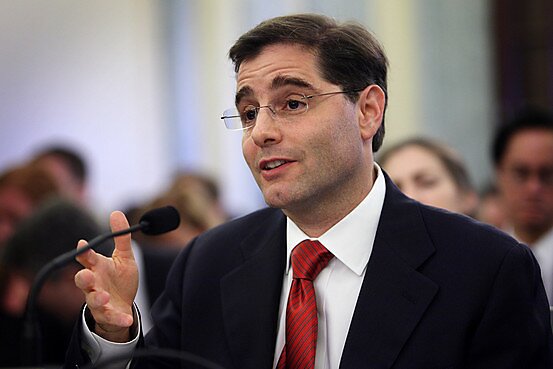I won’t go on at too much length about FCC Chairman Julius Genachowski’s speech at Brookings announcing his intention to codify the principle of “net neutrality” in agency rules—not because I don’t have thoughts, but because I expect it would be hard to improve on my colleague Tim Lee’s definitive paper, and because there’s actually not a whole lot of novel substance in the speech.
The digest version is that the open Internet is awesome (true!) and so the FCC is going to impose a “nondiscrimination” obligation on telecom providers—though Genachowski makes sure to stress this won’t be an obstacle to letting the copyright cops sniff through your packets for potentially “unauthorized” music, or otherwise interfere with “reasonable” network management practices.
And what exactly does that mean?
Well, they’ll do their best to flesh out the definition of “reasonable,” but in general they’ll “evaluate alleged violations…on a case-by-case basis.” Insofar as any more rigid rule would probably be obsolete before the ink dried, I guess that’s somewhat reassuring, but it absolutely reeks of the sort of ad hoc “I know it when I see it” standard that leaves telecoms wondering whether some innovative practice will bring down the Wrath of Comms only after resources have been sunk into rolling it out. Apropos of which, this is the line from the talk that really jumped out at me:
This is not about protecting the Internet against imaginary dangers. We’re seeing the breaks and cracks emerge, and they threaten to change the Internet’s fundamental architecture of openness. [.…] This is about preserving and maintaining something profoundly successful and ensuring that it’s not distorted or undermined. If we wait too long to preserve a free and open Internet, it will be too late.
To which I respond: Whaaaa? What we’ve actually seen are some scattered and mostly misguided attempts by certain ISPs to choke off certain kinds of traffic, thus far largely nipped in the bud by a combination of consumer backlash and FCC brandishing of existing powers. To the extent that packet “discrimination” involves digging into the content of user communications, it may well run up against existing privacy regulations that require explicit, affirmative user consent for such monitoring. In any event, I’m prepared to believe the situation could worsen. But pace Genachowski, it’s really pretty mysterious to me why you couldn’t start talking about the wisdom—and precise character—of some further regulatory response if and when it began to look like a free and open Internet were in serious danger.
If anything, it seems to me that the reverse is true: If you foreclose in advance the possibility of cross-subsidies between content and network providers, you probably never get to see the innovations you’ve prevented, while discriminatory routing can generally be detected, and if necessary addressed, if and when it occurs. And the worst possible time to start throwing up barriers to a range of business models, it seems to me, is exactly when we’re finally seeing the roll-out of the next-generation wireless networks that might undermine the broadband duopoly that underpins the rationale for net neutrality in the first place. In a really competitive broadband market, after all, we can expect deviations from neutrality that benefit consumers to be adopted while those that don’t are punished by the market. I’d much rather see the FCC looking at ways to increase competition than adopt regulations that amount to resigning themselves to a broadband duopoly.
Instead of giving wireline incumbents a new regulatory stick to whack new entrants with, the FCC could focus on facilitating exploitation of “white spaces” in the broadcast spectrum or experimenting with spectral commons to enable user-owned mesh networks. The most perverse consequence I can imagine here is that you end up pushing spectrum owners to cordon off bandwidth for application-specific private networks—think data and cable TV flowing over the same wires—instead of allocating capacity to the public Internet, where they can’t prioritize their own content streams. It just seems crazy to be taking this up now rather than waiting to see how these burgeoning markets shake out.

